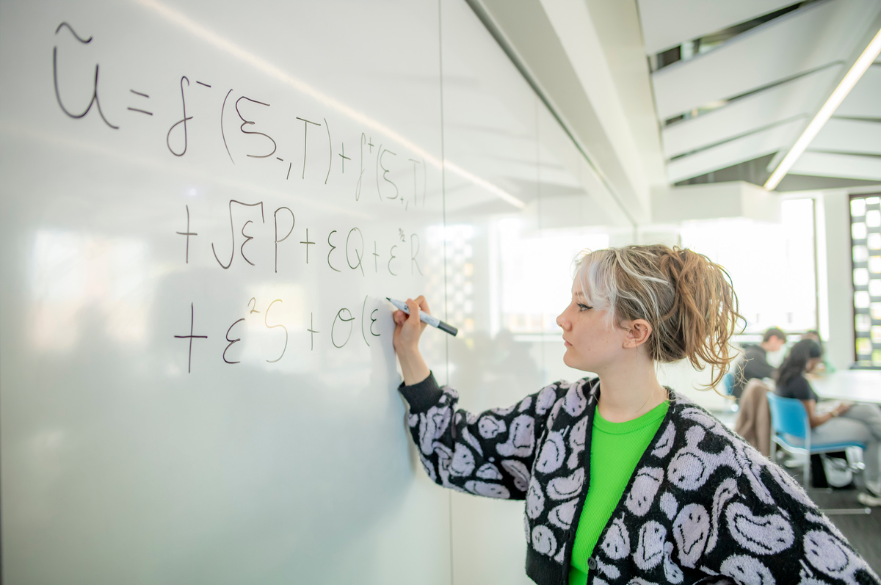Mathematics Undergraduate Researchers Studentship (MURS)
MURS offers funded opportunities for mathematics students to collaborate with academic staff on cutting-edge research projects.
What is MURS?

Welcome to the gateway of advanced mathematical exploration!
The Maths Undergraduate Research Studentship (MURS) at NTU is an immersive, research experience, spanning 6 to 8 weeks, designed exclusively for undergraduate students passionate about mathematics and research.
During the MURS program, our students engage in a cutting-edge research project, proposed by their faculty supervisor. This collaborative effort not only provides students with hands-on experience in conducting mathematical research but also fosters a close-knit community of scholars within our mathematics department. It is an excellent avenue for students to delve deeper into their research interests and make meaningful contributions to our academic community.
MURS is more than just a placement - it's a transformative journey that often ignites a passion for further studies in mathematics, such as pursuing a Master's or PhD. But don't just take our word for it, check what our students say below.
If you're an undergraduate student interested in mathematics, we invite you to join us.
The structure of the programme
The program spans 6 to 8 weeks, offering a dynamic environment where students use all our department's facilities. This setup encourages a focused and collaborative atmosphere, conducive to innovative thinking.
Throughout the programme, our students meet weekly with their supervisors for mentorship and guidance. These sessions are tailored to the project's needs and the supervisor's approach, ensuring a personalised learning experience. This structured experience drives the project forward and equips our students with the essential skills to tackle active research problems and master the art of conducting mathematical research.
Important information
Students expected to have an average of 2:1 or above in their assessments to date.
The MURS scheme is open to students who have just completed the second year of a BSc or MMath degree. We also accept students that have completed the third year of an MMath degree. You can usually only complete one MURS scheme during your studies.
Students must be available during the summer period (May - July) for meetings with the supervisor and completion of the work.
How do I find out about the projects?
Following the January exam session, a list of available mathematics project opportunities will be distributed to students via email and published on the Tutorial page. It is important for you to thoroughly review the project descriptions to determine which projects align with your interests and academic goals. You can also check the projects with potential supervisors to gain further insights into the projects and understand the expectations.
Submitting the project
After selecting your preferred projects, you will be required to submit an online form, ranking your top three choices and providing a brief explanation of your interest in each project. This form will be available on the original advertisement page, and submissions must be made by the specified deadline, typically within three weeks of the initial advertisement.
What does successful application look like?
To enhance your likelihood of success, it is beneficial to engage with the supervisor and demonstrate a keen interest in the project's details, including any reading that may be required.
Applications timeline:
- February - in early February project listings will be sent out via email and published on the Tutorial page. The deadline for submitting applications through the online portal is at the end of February.
- End of March - applicants will receive an email notification regarding the status of their application.
- April and May - selected students will be provided with additional information about project logistics, the criteria for earning a Certificate of Professional Practice (CiPP) for completing the placement, and financial arrangements for the bursary. The project work will commence in May or June
- May and June - Beginning of the projects.
Mathematics alumni Ruby Platt was awarded the MURS scholarship twice during her time at NTU.
Students project examples
Imagine diving into a project that not only fascinates you but also has the potential to make a real-world impact. Our programme opens the door to a wide range of research topics, ensuring something here will spark your curiosity and align with your career aspirations.
Our past students have embarked on a diverse array of captivating projects, ranging from exploring the transformative effects of Learning for Mastery in enhancing undergraduate education assessments, to crafting Mathematical Models in Finance that offer insights into the complex application of the Black-Scholes Model (BSM) in predicting the prices of European options. Additionally, students have harnessed the power of technology in their research for health, as seen in the project focused on Utilising Artificial Neural Networks for the Detection of Brain Tumours which underscores the utilisation of artificial neural networks, specifically convolutional neural networks (CNNs), to detect brain tumours in MRI images. It highlights the potential of mathematics in advancing medical diagnostics.
About our research
You can find more information about our staff research on our Mathematical Sciences page. From here, students can discuss opportunities that are listed on staff public profiles.
Current research opportunities include:
- Bioinformatics and Complex Systems Group
- Computational and Industrial Mathematics
- Mathematical Aspects of Computer Science